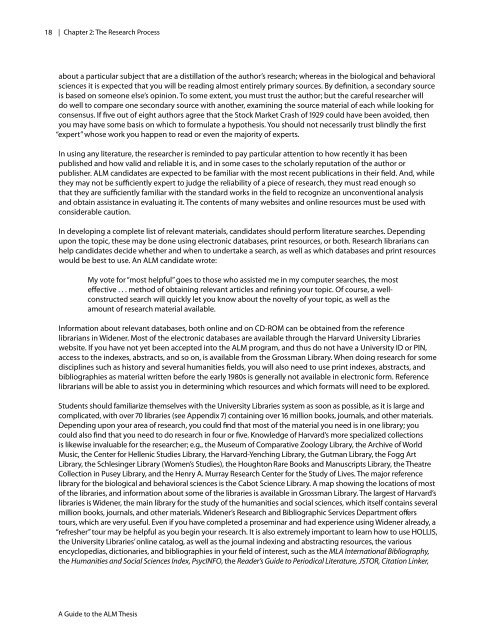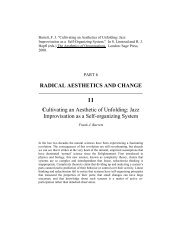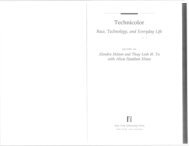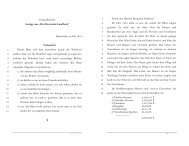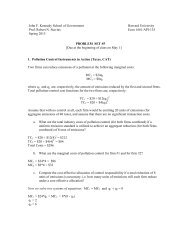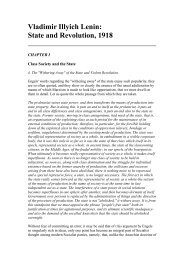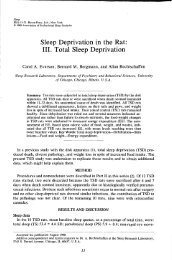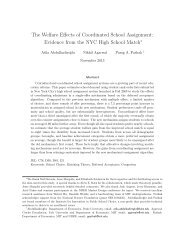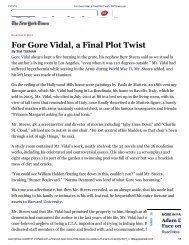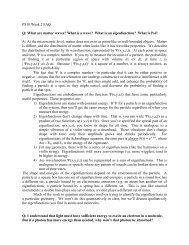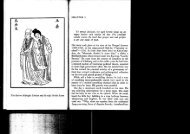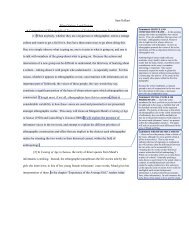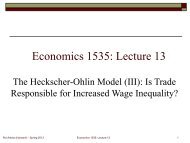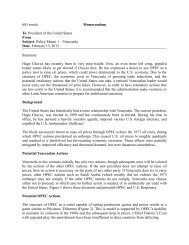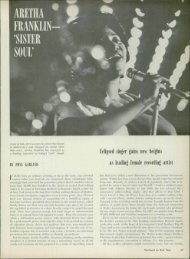A Guide to the ALM Thesis - iSites - Harvard University
A Guide to the ALM Thesis - iSites - Harvard University
A Guide to the ALM Thesis - iSites - Harvard University
You also want an ePaper? Increase the reach of your titles
YUMPU automatically turns print PDFs into web optimized ePapers that Google loves.
18<br />
| Chapter 2: The Research Process<br />
about a particular subject that are a distillation of <strong>the</strong> author’s research; whereas in <strong>the</strong> biological and behavioral<br />
sciences it is expected that you will be reading almost entirely primary sources. By definition, a secondary source<br />
is based on someone else’s opinion. To some extent, you must trust <strong>the</strong> author; but <strong>the</strong> careful researcher will<br />
do well <strong>to</strong> compare one secondary source with ano<strong>the</strong>r, examining <strong>the</strong> source material of each while looking for<br />
consensus. If five out of eight authors agree that <strong>the</strong> S<strong>to</strong>ck Market Crash of 1929 could have been avoided, <strong>the</strong>n<br />
you may have some basis on which <strong>to</strong> formulate a hypo<strong>the</strong>sis. You should not necessarily trust blindly <strong>the</strong> first<br />
“expert” whose work you happen <strong>to</strong> read or even <strong>the</strong> majority of experts.<br />
In using any literature, <strong>the</strong> researcher is reminded <strong>to</strong> pay particular attention <strong>to</strong> how recently it has been<br />
published and how valid and reliable it is, and in some cases <strong>to</strong> <strong>the</strong> scholarly reputation of <strong>the</strong> author or<br />
publisher. <strong>ALM</strong> candidates are expected <strong>to</strong> be familiar with <strong>the</strong> most recent publications in <strong>the</strong>ir field. And, while<br />
<strong>the</strong>y may not be sufficiently expert <strong>to</strong> judge <strong>the</strong> reliability of a piece of research, <strong>the</strong>y must read enough so<br />
that <strong>the</strong>y are sufficiently familiar with <strong>the</strong> standard works in <strong>the</strong> field <strong>to</strong> recognize an unconventional analysis<br />
and obtain assistance in evaluating it. The contents of many websites and online resources must be used with<br />
considerable caution.<br />
In developing a complete list of relevant materials, candidates should perform literature searches. Depending<br />
upon <strong>the</strong> <strong>to</strong>pic, <strong>the</strong>se may be done using electronic databases, print resources, or both. Research librarians can<br />
help candidates decide whe<strong>the</strong>r and when <strong>to</strong> undertake a search, as well as which databases and print resources<br />
would be best <strong>to</strong> use. An <strong>ALM</strong> candidate wrote:<br />
My vote for “most helpful” goes <strong>to</strong> those who assisted me in my computer searches, <strong>the</strong> most<br />
effective . . . method of obtaining relevant articles and refining your <strong>to</strong>pic. Of course, a wellconstructed<br />
search will quickly let you know about <strong>the</strong> novelty of your <strong>to</strong>pic, as well as <strong>the</strong><br />
amount of research material available.<br />
Information about relevant databases, both online and on CD-ROM can be obtained from <strong>the</strong> reference<br />
librarians in Widener. Most of <strong>the</strong> electronic databases are available through <strong>the</strong> <strong>Harvard</strong> <strong>University</strong> Libraries<br />
website. If you have not yet been accepted in<strong>to</strong> <strong>the</strong> <strong>ALM</strong> program, and thus do not have a <strong>University</strong> ID or PIN,<br />
access <strong>to</strong> <strong>the</strong> indexes, abstracts, and so on, is available from <strong>the</strong> Grossman Library. When doing research for some<br />
disciplines such as his<strong>to</strong>ry and several humanities fields, you will also need <strong>to</strong> use print indexes, abstracts, and<br />
bibliographies as material written before <strong>the</strong> early 1980s is generally not available in electronic form. Reference<br />
librarians will be able <strong>to</strong> assist you in determining which resources and which formats will need <strong>to</strong> be explored.<br />
Students should familiarize <strong>the</strong>mselves with <strong>the</strong> <strong>University</strong> Libraries system as soon as possible, as it is large and<br />
complicated, with over 70 libraries (see Appendix 7) containing over 16 million books, journals, and o<strong>the</strong>r materials.<br />
Depending upon your area of research, you could find that most of <strong>the</strong> material you need is in one library; you<br />
could also find that you need <strong>to</strong> do research in four or five. Knowledge of <strong>Harvard</strong>’s more specialized collections<br />
is likewise invaluable for <strong>the</strong> researcher; e.g., <strong>the</strong> Museum of Comparative Zoology Library, <strong>the</strong> Archive of World<br />
Music, <strong>the</strong> Center for Hellenic Studies Library, <strong>the</strong> <strong>Harvard</strong>-Yenching Library, <strong>the</strong> Gutman Library, <strong>the</strong> Fogg Art<br />
Library, <strong>the</strong> Schlesinger Library (Women’s Studies), <strong>the</strong> Hough<strong>to</strong>n Rare Books and Manuscripts Library, <strong>the</strong> Theatre<br />
Collection in Pusey Library, and <strong>the</strong> Henry A. Murray Research Center for <strong>the</strong> Study of Lives. The major reference<br />
library for <strong>the</strong> biological and behavioral sciences is <strong>the</strong> Cabot Science Library. A map showing <strong>the</strong> locations of most<br />
of <strong>the</strong> libraries, and information about some of <strong>the</strong> libraries is available in Grossman Library. The largest of <strong>Harvard</strong>’s<br />
libraries is Widener, <strong>the</strong> main library for <strong>the</strong> study of <strong>the</strong> humanities and social sciences, which itself contains several<br />
million books, journals, and o<strong>the</strong>r materials. Widener’s Research and Bibliographic Services Department offers<br />
<strong>to</strong>urs, which are very useful. Even if you have completed a proseminar and had experience using Widener already, a<br />
“refresher” <strong>to</strong>ur may be helpful as you begin your research. It is also extremely important <strong>to</strong> learn how <strong>to</strong> use HOLLIS,<br />
<strong>the</strong> <strong>University</strong> Libraries’ online catalog, as well as <strong>the</strong> journal indexing and abstracting resources, <strong>the</strong> various<br />
encyclopedias, dictionaries, and bibliographies in your field of interest, such as <strong>the</strong> MLA International Bibliography,<br />
<strong>the</strong> Humanities and Social Sciences Index, PsycINFO, <strong>the</strong> Reader’s <strong>Guide</strong> <strong>to</strong> Periodical Literature, JSTOR, Citation Linker,<br />
A <strong>Guide</strong> <strong>to</strong> <strong>the</strong> <strong>ALM</strong> <strong>Thesis</strong>


